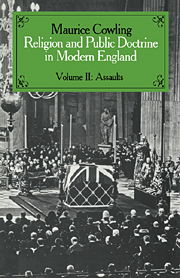Book contents
- Frontmatter
- Foreword
- Contents
- Projected contents of Volume III (for publication c. 1988–90)
- INTRODUCTION
- I THE ASSAULT ON THE EIGHTEENTH CENTURY
- II THE ASSAULT ON CHRISTIANITY
- III THE ASSAULT ON CHRISTIANITY IN THE TWENTIETH CENTURY
- IV ASSAULTS ON THE ASSAILANTS
- CONCLUSION: ASSAULTS AND ACCOMMODATIONS
- Notes
- Index of main names
CONCLUSION: ASSAULTS AND ACCOMMODATIONS
Published online by Cambridge University Press: 23 December 2009
- Frontmatter
- Foreword
- Contents
- Projected contents of Volume III (for publication c. 1988–90)
- INTRODUCTION
- I THE ASSAULT ON THE EIGHTEENTH CENTURY
- II THE ASSAULT ON CHRISTIANITY
- III THE ASSAULT ON CHRISTIANITY IN THE TWENTIETH CENTURY
- IV ASSAULTS ON THE ASSAILANTS
- CONCLUSION: ASSAULTS AND ACCOMMODATIONS
- Notes
- Index of main names
Summary
‘It is only in so far as he succeeds, through hermeneutics, in transmuting his materials into spiritual messages that the historian of religion will fulfil his role in contemporary culture.’
Mircea Eliade The Quest 1969 p. 36.‘The question concerning the essence of truth touches a profound crisis not only of theology but also of the Christian churches and Christian faith generally in the present age. Since the Enlightenment, the question of the truth of their faith has been put to Christians with constantly increasing poignancy … The question … is not about … a particular truth of one kind or another but with truth itself … with whether Christianity can still disclose to us today the unity of the reality in which we live, as it once did in the ancient world.’
Wolfhart Pannenberg What is Truth (1962) in Basic Questions in Theology 1971 edn vol. ii p. 1.‘And after all what is a lie? 'Tis but
The truth in masquerade, and I defy
Historians, heroes, lawyers, priests to put
A fact without some leaven of a lie.
The very shadow of true truth would shut
Up annals, revelations, poesy,
And prophecy, except it should be dated
Some years before the incidents related.’
Byron, Don Juan, Canto XI 1823.The discussion in which we are engaged began with the destruction of the confessional state and the ancien régime and has surveyed the most coherent attempts to provide arguments in favour of a successor-régime. It has been concerned with arguments rather than with actions – with the fears and hopes entertained by the thinkers with whom it has dealt, not with the successes and failures which have followed.
- Type
- Chapter
- Information
- Religion and Public Doctrine in Modern England , pp. 346 - 350Publisher: Cambridge University PressPrint publication year: 1985



